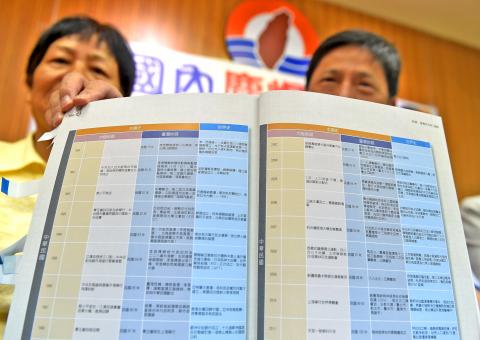The Taiwan Solidarity Union (TSU) caucus yesterday urged teachers not to use the new version of high-school social studies textbooks approved by the National Academy for Educational Research (NAER), which it said contain distorted and unsubstantiated historical information and aim to instill a China-centric mindset in young Taiwanese.
“The Ministry of Education has claimed that it was only responsible for reviewing high-school curricula and that it was up to textbook publishers to decide the content of the books they print,” TSU caucus whip Lai Chen-chang (賴振昌) told a news conference in Taipei.
However, Lai said that since the new curriculum has been “painted red,” most of the publishers have fallen in line, printing textbooks that do not conform to historical facts.

Photo: Chien Jung-fong, Taipei Times
Singling out the Shi Ji Cultural Publishing Co (史記文化事業), Lai said that the company combined the histories of Taiwan and China into what it called “national history,” which also included historical events that occurred during the Japanese colonial era.
“Shi Ji’s proprietor, Cheng Chih-shen (鄭旗生), doubles as the executive officer of the pro-unification Chinese Integration Association, while one of the firm’s textbook compilation committee members, Hao Ming-huang (邵銘煌), is the former director of the Chinese Nationalist Party’s [KMT] history department. Both men are considered ‘deep-blue’ diehards,” Lai said.
Lai said the publisher’s history textbook used the controversial term “returning to the embrace of the motherland” twice.
The book suggests that former president Lee Teng-hui’s (李登輝) formulation of the “two states theory” in 1999 hindered cross-strait negotiations, and the “one side, one country” model proposed by Lee’s successor, Chen Shui-bian (陳水扁), had destabilized Taiwan-US relations, Lai said.
The book has two full pages on the so-called “1992 consensus” embraced by President Ma Ying-jeou (馬英九) and also praises the Economic Cooperation Framework Agreement for elevating cross-strait exchanges to the next level. Lai said.
The “1992 consensus” refers to a tacit understanding that the KMT says was reached with Beijing that both sides agree that there is only “one China,” with each side having its own interpretations of what China is. Former KMT lawmaker (蘇起) said in 2006 that he had made up the term in 2000, when he was head of the Mainland Affairs Council.
“This is not a school textbook, but rather propaganda material designed to promote the KMT’s history and cross-strait unification,” Lai said, calling on high-school teachers not to use the new editions of book.
TSU Legislator Chou Ni-an (周倪安) said the lack of references in the books to democracy activist Deng Nan-jung (鄭南榕), the 228 Incident and the 1979 Kaohsiung Incident underscored the curriculum review team’s aim to cover up the former KMT regime’s disregard for human rights by creating the impression that the government had attached great importance to the issue.
“We as Taiwanese must stand up against the government’s brainwashing scheme and safeguard true human rights and democracy,” Chou said.

AGING: As of last month, people aged 65 or older accounted for 20.06 percent of the total population and the number of couples who got married fell by 18,685 from 2024 Taiwan has surpassed South Korea as the country least willing to have children, with an annual crude birthrate of 4.62 per 1,000 people, Ministry of the Interior data showed yesterday. The nation was previously ranked the second-lowest country in terms of total fertility rate, or the average number of children a woman has in her lifetime. However, South Korea’s fertility rate began to recover from 2023, with total fertility rate rising from 0.72 and estimated to reach 0.82 to 0.85 by last year, and the crude birthrate projected at 6.7 per 1,000 people. Japan’s crude birthrate was projected to fall below six,

Conflict with Taiwan could leave China with “massive economic disruption, catastrophic military losses, significant social unrest, and devastating sanctions,” a US think tank said in a report released on Monday. The German Marshall Fund released a report titled If China Attacks Taiwan: The Consequences for China of “Minor Conflict” and “Major War” Scenarios. The report details the “massive” economic, military, social and international costs to China in the event of a minor conflict or major war with Taiwan, estimating that the Chinese People’s Liberation Army (PLA) could sustain losses of more than half of its active-duty ground forces, including 100,000 troops. Understanding Chinese

US President Donald Trump in an interview with the New York Times published on Thursday said that “it’s up to” Chinese President Xi Jinping (習近平) what China does on Taiwan, but that he would be “very unhappy” with a change in the “status quo.” “He [Xi] considers it to be a part of China, and that’s up to him what he’s going to be doing, but I’ve expressed to him that I would be very unhappy if he did that, and I don’t think he’ll do that. I hope he doesn’t do that,” Trump said. Trump made the comments in the context

SELF-DEFENSE: Tokyo has accelerated its spending goal and its defense minister said the nation needs to discuss whether it should develop nuclear-powered submarines China is ramping up objections to what it sees as Japan’s desire to acquire nuclear weapons, despite Tokyo’s longstanding renunciation of such arms, deepening another fissure in the two neighbors’ increasingly tense ties. In what appears to be a concerted effort, China’s foreign and defense ministries issued statements on Thursday condemning alleged remilitarism efforts by Tokyo. The remarks came as two of the country’s top think tanks jointly issued a 29-page report framing actions by “right-wing forces” in Japan as posing a “serious threat” to world peace. While that report did not define “right-wing forces,” the Chinese Ministry of Foreign Affairs was